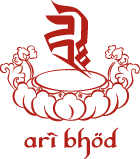HEREIN RESIDES
THE TREATISE ON THE MODES OF BEING:
“THE JEWEL THAT GATHERS FORTH
DIVINITIES AND GLORY”
MIPHAM JAMYANG NAMGYAL GYATSO
translated by
the Ari Bhöd Translation Committee
Introduction
The Ari Bhöd translation committee is pleased to provide to you an English translation of Treatise on the Modes of Being: “The Jewel that Gathers Forth Divinities and Glory,” (lugs kyi bstan bcos lha dang dpal ‘du ba’i nor bu) written by the renowned Tibetan scholar-saint, Mipham Jamyang Namgyal Gyatso (Mipham Rinpoche, 1846-1912). The subject matter of this work is that of the lugs gnyis, the two traditions or modes of being: the worldly and the spiritual. In this text Mipham Rinpoche teaches both worldly ethics and spiritual ethics in a manner relevant to both householders and renunciates. The teachings translated here, if followed, have the potential to bring worldly respect, happiness, and the fulfillment of one’s aims to householders; yet can also be understood as a foundation for the accomplishment of pure and genuine spiritual practice for the renunciate.
In this text, the two modes of being–the worldly mode of being and the spiritual mode of being, relating respectively to worldly ethics and spiritual ethics–reflect aspects of Tibetan culture, where worldly ethics are exemplified by particular codes of conduct. For example, an individual who is younger should respect and take advice from his or her elders, and hierarchically lower individuals should act in a similar manner toward their superiors. At the same time, one should serve one’s subordinates, and act with kindness and compassion toward them. To those who are one’s equals, one should be honest, straight-forward and patient. In this way worldly ethics show people how to lead a harmonious worldly life. Spiritual ethics are subsumed within the three vows of Pratimoksha, Bodhisattva, and Tantra, yet teachings on the two modes of being generally do not include teachings on the three vows. Thus, even though teachings on the two modes of being claim to relate to worldly and spiritual ethics, they are often considered to be teachings geared towards householders or laypeople who cannot undertake a path fully dedicated to Buddhist practice. In a sense this is true and “The Jewel that Gathers Forth Divinities and Glory” is indeed a teaching on how to live in the world. It seems to be worldly rather than spiritual advice. Yet Mipham Rinpoche quickly assures us that the text is also relevant to renunciates when he says:
Having basic human ethics is the root of Dharma.
If one does not have even worldly level morality,
It is absolutely impossible to ever uphold
The way of Dharma.
We should understand therefore that the practice of Dharma is rooted in humanitarian ethics and that the view of worldly ethics is also the view of the Dharma. In this way the text brings together two otherwise distinct worlds and is relevant to all.
Thus, in the spirit of the text translated here, The Ari Bhöd Translation Committee would like to extend our sincere respect and gratitude to Khenpo Thrinley Dorje Rinpoche, Senior Khenpo of Dodrupchen Monastery in Gangtok, Sikkim (Chorten Gonpa). Khenpo Thrinley not only suggested that we translate this text for its far reaching benefit for all beings, but also graciously bestowed commentarial teachings on this text and the subject matter of the two modes of being—which is the source of much of the introductory material written above and some of the footnotes the reader will find below—upon members of the Ari Bhöd translation committee. We would also like to thank the Venerable Professor Nyichang Rinpoche who has also bestowed commentarial teachings related to this text upon the Ari Bhöd Translation Committee and the general public at Ari Bhöd’s retreat land, Pema Drawa, on two separate occasions in the summers of 2012 and 2013. We must also extend our gratitude to the Most Venerable Tulku Thondup Rinpoche, who with the gentle care of a loving parent continues to encourage and shepherd many of our translation efforts. Lastly, as always, we extend our immeasurable gratitude to our late lama and Ari Bhöd’s founder, the Venerable Lama Chödak Gyatso Nubpa Rinpoche (1951-2009) who lived this life working ceaselessly to maintain the ancient Vajrayana teachings from both the practice and academic perspective. Lama Chödak Gyatso Nubpa’s selfless undertaking was purely dedicated for the benefit of all mother sentient beings. Lama Gyatso was a guiding example to us all, both spiritually and ethically, and in our effort to follow his example we offer this translation of the “The Jewel that Gathers Forth Divinities and Glory” as a gift for all.
May it be of benefit!
THE TREATISE ON THE MODES OF BEING:
“THE JEWEL THAT GATHERS FORTH DIVINITIES AND GLORY”
by Mipham Rinpoche is available for printing as a complimentary download.
Click here for the downloadable PDF.
If you would like to make a donation for this translation, you may donate here.


